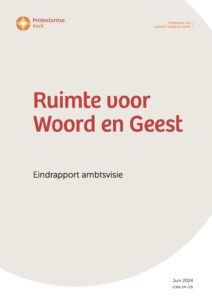(Reflection Bulletin June 2024)
Written by Delta Minister Rev. Ari van der Maas
‘How are you now?’ A question that gets asked a lot these days. For example, at the end of a meeting on the threshold of a room or house, or when walking to the car, or during an introductory talk.

Class Minister Rev. Arie van der Maas. | Photo by Koos van Noppen
Genuine interest in how I would recover and return to work after being “off” last fall.
‘How are you now?’ An important question that we probably don’t ask each other enough, despite the many things we do in life and in the church. Me too. A little bit. Especially in church as it is the perfect place to see each other’s eyes and hearts.
In answering the question posed, I can now generously point out that things are going well. The number of months of rest, reflection, and introspection has really benefited me. And this – as you say these days – I feel like I have my strength back. In the midst of so many things, both quantitative and qualitative, that make church work difficult, I sought and gained space to continue on the path. Space to do what I’ve been called to do and know I’m called to do. With greater interest in and connection to the rich content of Scripture, theology and culture and in valuable fellowship with others in the broad space of the Church. Local and classical, but also national in service and complex organization. Space to live and work, space for work.
Space for the profession
A Space for Invitation I have come to see more clearly that this is also what the church will be like in the years to come. For congregations and other church spaces, in all their diversity, for people committed to and for the church. And also to the Church as a whole, with its many structures and bodies, rules and protocols. Much time and energy has been spent on the possible or (sometimes) impossible future of the church. It is often about many things. About money, about collaborations, about color and taste, about numbers, and sometimes about marketing strategies.

I have previously mentioned a number of authors who I feel make important contributions to what is currently theologically important. See, among others, the impression of the classic meeting in February (click here) Now I would like to add one more. A helpful, easy-to-read booklet by Andrew Root and Blair Bertrand entitled Waiting on the Lord has recently been published. I highly recommend it. click here
If we in church and society begin to become more concerned with content, and our calling rather than the life and survival of the church, then I certainly believe there is a future for the church, the content of the church, and the Word. , in any way. Seek first the Kingdom of God and His righteousness (seek Him, seek Him within the church and especially outside it) and all these things will be added to you (Matthew 6:31).
Space for word and spirit

I’m writing Three years But when I was in General Synod from 2004 to 2007, there were also reports and proposals trying to take steps to do better justice to what was necessary and possible from the point of view of the church and from the point of view of those working in the church. Long term issue. Ultimately, there is now a proposal that is not ideal in all respects and in everyone’s eyes, but which – I am sure – does as much justice as possible to the many relevant interests and viewpoints in this area. And its complexity. Because one is closely related to the other. When you pull one string, another string starts moving. It is about what is needed in municipalities in different contexts, related to education levels, jobs and competencies, lateral arrivals with previously acquired competencies, the interests of universities and colleges, different pay scales and the justification for this, but also the affordability of municipalities, including small businesses, It’s about good hiring practices, suitability and much more…. But within all this complexity, it is about a space for the word and the spirit, and a space for advocacy.

“Coffee buff. Twitter fanatic. Tv practitioner. Social media advocate. Pop culture ninja.”











More Stories
Which can cause an increase in nitrogen.
The Central State Real Estate Agency has no additional space to accommodate Ukrainians.
The oystercatcher, the “unlucky national bird,” is increasingly breeding on rooftops.